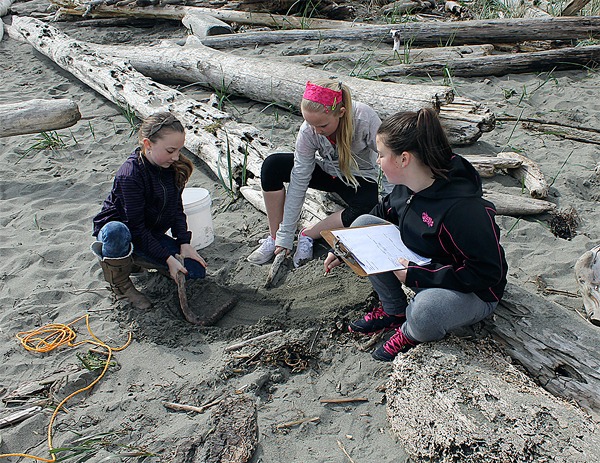Mention of the word “nurdles” evoked plenty of giggles from South Whidbey elementary school students during a field trip to the marina in Langley Wednesday, yet they were quick to comprehend the danger that micro-plastics and other forms of pollution pose to marine wildlife and habitat.
The trip was one of several this week where fifth graders, and seventh graders from the middle school, visited the marina. The facility served as an outdoor, hands-on learning environment where students studied whales, plankton, made art from beach materials and discovered ways they could help to preserve the marine environment.
The students have been studying marine ecology and ecosystems throughout the school year, and the trip acted as a culminating event, a real-life supplement to their classroom studies.
John LaVassar, one of the four fifth-grade teachers, said the children began their study of ecosystems in the fall by making a trip to Padilla Bay, where they studied plankton. They also obtained salmon eggs from Sultan and observed the fish as they hatched and grew in a tank at the school.
The salmon will be released into Maxwelton Creek.
During their field trip, fifth graders were divided into three groups. One group headed out on a small whale-watching vessel, another joined Lori O’Brien from Whidbey Watershed Stewards on a walking trip through Langley and the rest learned about micro-plastics. All three groups also had the opportunity to create art on the beach using natural materials such as driftwood and seaweed in the style of Andy Goldsworthy. All students also visited the Langley Whale Center.
Each of the teachers noted that they and their students felt the field trip to be the most informative and enjoyable they’d taken thus far.
“I don’t know anybody who wasn’t engaged,” said Kathy Callahan, fifth-grade teacher.
While on the boat, students got the chance to use a telescope and try their hand at steering. They also used microscopes to study organisms such as plankton.
Dominic Montaperto said he’d learned about Lolita, an orca who was taken from Penn Cove in the 1970s. Members of Orca Network and other organizations are working to bring Lolita home to be reunited with her family.
Annie Philp added that, although she’d previously watched the documentary “Blackfish,” she learned even more by visiting the Langley Whale Center on Second Street and being on the boat.
“They’re keeping whales captive in SeaWorld, which is horrible, in my opinion,” Montaperto said.
Ben Soroos, Montaperto, Natalie Rieck and others commented that the watershed walk and lesson on micro-plastics have influenced their considerations as consumers, and said they plan to look more closely at ingredients and packaging in order to use less plastic and produce less pollution.
“I learned that when animals eat the micro-plastic it starves them and they die,” said Rieck, adding that she’ll be sure to cut the plastic rings used to package cans and bottles as well in order to prevent animals from getting caught.
The fifth-grade field trips were funded by a $1,400 grant from the non-profit South Whidbey Schools Foundation. The foundation also funded four other field trips for fifth graders during the 2014-15 school year. The Langley Middle School seventh-grade oceanography program was also funded by South Whidbey Schools Foundation with a grant of $1,280.



